Travellers looking for an eco holiday in Thailand can now rest easy. Thai Tourism offers planned environmentally-friendly tours, from central Thailand to the northern tribal enclaves of Chiang Mai, and Chiang Rai to Isaan in the northeast region. Mallika Naguran reports.
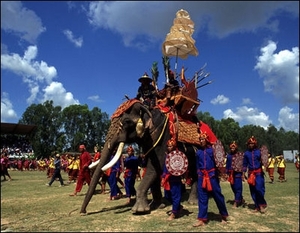
In Surin, elephants are celebrated with pomp and grandeur
Bangkok, 11 April 2011. Twenty Thai ‘green routes’ have been mapped out to cater for those wanting an authentic experiences with low environmental impact, says Tourism Authority of Thailand (TAT). Four pilot routes are already up and running with the sixteen to be developed later this year.
A typical route involves converted or trained “greenies”: tour operators with specialised eco-tourism knowledge; Thai tour guides; small and medium-sized ‘green’ hotels; ‘green’ restaurants, and Thai community-based tourism groups. Other vital ingredients are a green essence and theme, innovative and interactive green activities, and local insight.
Green Routes
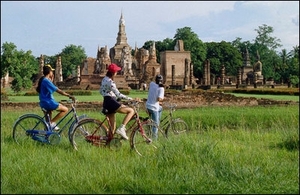
Get closer to Thai ancient monuments on pollution-free bikes
The initial four green routes mark out short stay holidays in central Thailand, Chiang Mai, Chiang Rai and Isaan (download detailed itinerary below). According to TAT this is the first step towards greening Thailand’s tourism industry as tour operators buy into sustainable tourism, and start to incorporate changes within their business processes.
The routes took 18 months to plan, and are the result of consultation and co-operation between the Thai Ecotourism and Adventure Travel Association (TEATA), Greenleaf Foundation, The Thailand Community Based Tourism Institute (CBT-I) and the European Center for Eco and Agro Tourism (ECEAT).
“All four organisations have worked for well over 10 years to pioneer sustainable tourism, with tour operators (TEATA), local communities (CBT-I) and green hotels (Greenleaf) leading in Thailand. This is the strength of the project,” says Peter Richards, sustainable tourism specialist with ECEAT.
Corporate Social Responsibility and Market Access Partnerships
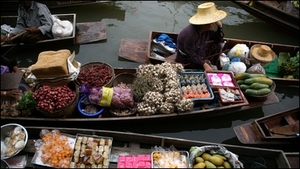
In Amphava as elsewhere in Thai, floating markets are a wonder.
Three quarters of the £230,000 project was funded by the European Union, and billed with the title Corporate Social Responsibility and Market Access Partnerships Project for Thai sustainable tourism suppy chains (CSR-MAP). The rest of the funding came from Thai governing bodies.
“CSR-MAP aims to make Thai-EU supply chains more sustainable and develop great new products for European tourists who are looking for an authentic, responsible green holiday,” said Duangkamol Chansuriyawong , CSR-MAP project director and former president of TEATA.
The project introduced 20 common principles to define sustainable tourism, and drafted new service and sustainability standards to guide the hospitality and tourism industry.
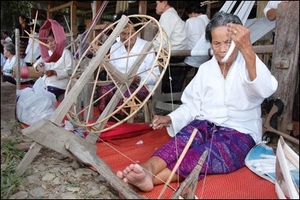
Rong Ngang community needs the support of tourism to provide for their welfare.
The standards are based on the Global Sustainable Tourism Criteria (GSTC), comparable to national standards then localised to suit the Thai context.
TAT says the next step will be capacity building. Training of tourism industry players such as local tour operators and hotels will soon be made available, in the Thai language.
According to Supaporn Prach-Umpai, vice president of TEATA, specialist operator Travelife will conduct the required training with course dates, duration and pricing to be announced soon. This training component from Travelife is being supported by the Dutch Government's Sustainable Trade Initiative (IDH).
Trained Eco Operators
Comprehensive training will be assisted by the Greenleaf Foundation, a certification body in Thailand for green hotels that has already cooperated with Travelife to offer training for hotels, added Prach-Umpai.
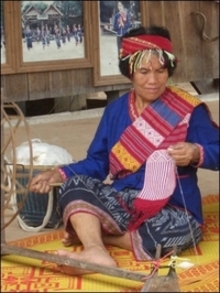
Kok Kong village displays skilled artisans of vibrant fabric
The Travelife project is being led by EU tour operator associations (specifically ANVR and ABTA), and implemented by the European Center for Eco and Agro Tourism (ECEAT - http://www.eceat-projects.org/), explains Peter Richards, coordinator for the Thailand-IDH Travelife Project.
“The Thailand Travelife project is intended to build upon the CSR-MAP project and hopefully to move European and Thai tourism stakeholders several steps further towards a mutually supportive, well informed, cooperation for sustainable tourism,” says Richards.
Photos courtesy of Tourism Authority of Thailand (TAT).
Gaia Discovery thanks TAT, Thai Airways and Renaissance Bangkok Ratchaprasong for their kind hospitality during this media coverage.
For more information contact: csr_marketing AT teata.or.th; admin AT teata.or.th
Peter Richards: peter.e.richards AT gmail DOT com
Download the CSR-MAP (6.5M)
Download the Thai Green Routes (17.8M)
Download the Sustainable Thai Tour Operator Standards (232K)
Download the Ecoguide Standards (126K)
For more information, go to:
Greenleaf Foundation http://www.greenleafthai.org/en/green_hotel/index.php
Thailand Community Based Tourism Institute CBT-I http://www.cbt-i.org
European Center for Eco and Agro Tourism (ECEAT) http://www.eceat.org/
Global Sustainable Tourism Criteria (GSTC) http://www.sustainabletourismcriteria.org
Association of Thai Travel Agents (ATTA) http://www.atta.or.th
Read about Thailand Tourism Seven Green Concepts.